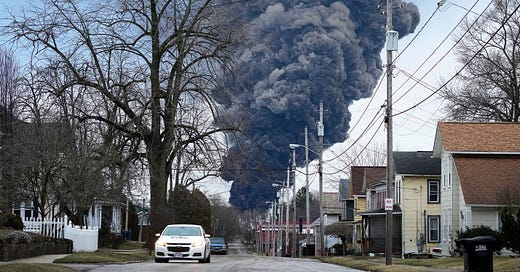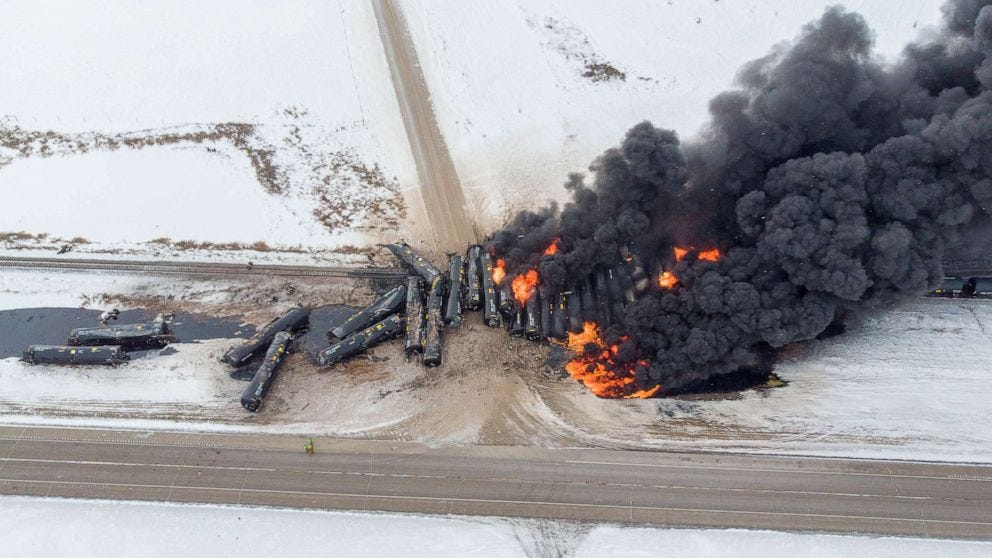Why the Ohio train derailment is a big deal
The incident highlights the public’s mistrust of government, mistrust of the media, and the ravages of four decades of reckless free market ideology
On February 3, a freight train operated by Norfolk Southern ($NSC) carrying 50 cars[i] of cargo, some deemed hazardous, derailed in East Palestine, an Ohio town of 4,761[ii]. Authorities ordered the immediate evacuation of hundreds of residents within a 1-mile by 2-mile area surrounding East Palestine on February 6[iii]. Later that day[iv], emergency responders intentionally set some of the chemicals on fire to neutralize them, emitting a massive black smoke plume. Among the chemicals was vinyl chloride[v], which when burned creates low concentrations of phosgene gas[vi]. Phosgene gas was used as a chemical weapon in WW1. Authorities then told residents that it was safe to return and drink tap water[vii].
Environmental disasters can become major events with political ramifications that extend far beyond the affected area. Three Mile Island, Hurricane Katrina, Superstorm Sandy, and the Deepwater Horizon oil spill are some American examples. If a corporation is involved, it can be catastrophic for them. Norfolk Southern has already lost $5 billion in market value[viii] since the derailment and legal challenges are multiplying. In America’s hyper-politicized media ecosystem, the derailment has become a culture war issue, with stories appearing earlier and more frequently in conservative media outlets like Fox News. The charge is that the Democratic Biden Administration is negligent in its response to an issue that primarily affects white working-class citizens who are mostly Republicans.
There are multiple theories as to what happened, including brake failure. It’s impossible to say what happened at this juncture and a preliminary report due in March by the National Transportation Safety Board (NTSB) will shed more light on the matter. In fact, the NTSB chair Jennifer Homendy made a statement to ask for time and to stop speculating on the cause of the wreck:

But three conclusions are clear before the release of the report: 1) the public mistrusts the government, 2) the public mistrusts the media, and 3) four decades of neoliberalism have made freight trains less safe.
Mistrust of government
Both state and federal government officials, of each political party, have cleared residents of East Palestine to return to their homes, but unease remains. The reason? A lack of trust. It is often claimed that the government’s response to COVID-19 created the mistrust but an examination of the data show that trust has generally been falling in all three branches of government since the turn of the millennium. Today, less than half of the public trusts the government, with only 38% trusting the legislature. Our representative system is built on trust and its hard to see how that system will work if current trends continue.
Figure 1: American's growing mistrust in government[ix]
Mistrust of the media
The media play an important role in American democracy by holding the government accountable. But America has shifted to a bifurcated liberal/conservative media ecosystem where outlets give their audience what they want to hear. The result is Two Americas, each with their own set of facts. As we’ve seen, this doesn’t really work. In the case of the East Palestine train derailment, only one half (in this case the conservative half) initially covered the story. This led to an assumption of a cover-up and sowed mistrust, making the situation worse than it already was. As Figure 2 shows, more people actively distrust the media than trust it, leading people to turn to citizen journalists on Twitter and Substack before established outlets. Long-term, this media transition is inevitable and will democratize the flow of information. But in the short-term we’re still getting used to the change, don’t know who to trust, and sensationalism runs rampant. This makes the current information environment very chaotic.
Figure 2: American's growing mistrust in media[x]
The ravages of neoliberalism
A recurring theme on Ad Astra is how four decades of neoliberalism has made America’s economy fragile and hurt consumers. This was the case in our pieces on the holiday Southwest Airlines delays, monopolies, and the near-rail strike late last year. Though the specific cause of the East Palestine train derailment is to be determined by the NTSB, warning signs coming from the railroad industry have been blinking red for years. Take this report from the AP in 2021:
Even as railroads are operating longer and longer freight trains that sometimes stretch for miles, the companies have drastically reduced staffing levels, prompting unions to warn that moves meant to increase profits could endanger safety and even result in disasters.
More than 22% of the jobs at railroads Union Pacific, CSX and Norfolk Southern have been eliminated since 2017, when CSX implemented a cost-cutting system called Precision Scheduled Railroading that most other U.S. railroads later copied.[xi]
On Precision Scheduled Railroading:
Precision Scheduled Railroading calls for running fewer, longer trains with a mix of freight to reduce the number of crews and locomotives needed to deliver millions of tons of goods nationwide.
By increasing the length of trains, railroads can reduce total trips, cut down on the number of engines and railcars needing maintenance, and manage with fewer employees. Some trains now stretch longer than 2 miles (3.2 kilometers).[xii]
The data are not clear that this new way of operating has increased accident rates, but common sense tells you that longer trains, with more hazardous chemicals, with fewer human operators are more dangerous when they do derail. There is no question that railroads have cut staff, cut maintenance, and taken other measures to benefit shareholders. But they’ve followed the law and all applicable regulations, which have been whittled away over the last forty years.
As Ice-T once said, don’t hate the player, hate the game.
[i] https://www.cincinnati.com/story/news/2023/02/15/east-palestine-ohio-train-derailment-facts/69898564007/
[ii] https://en.wikipedia.org/wiki/East_Palestine,_Ohio
[iii] https://www.cincinnati.com/story/news/2023/02/15/east-palestine-ohio-train-derailment-facts/69898564007/
[iv] https://www.cincinnati.com/story/news/2023/02/15/east-palestine-ohio-train-derailment-facts/69898564007/
[v] https://www.cnn.com/2023/02/08/us/east-palestine-ohio-train-derailment-fire-wednesday/index.html
[vi] https://www.tandfonline.com/doi/abs/10.1080/0002889718506429
[vii] https://www.cnn.com/2023/02/08/us/east-palestine-ohio-train-derailment-fire-wednesday/index.html
[viii] https://www.msn.com/en-us/money/topstocks/norfolk-southern-stock-drops-since-derailment/ar-AA17CKCz
[ix] Gallup
[x] Gallup
[xi] https://apnews.com/article/business-aab7d3084a8d17d8d721d2cb750be323
[xii] https://apnews.com/article/business-aab7d3084a8d17d8d721d2cb750be323








